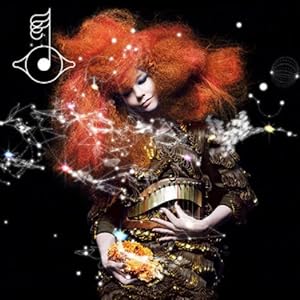 By way of a disclaimer, this review doesn’t come from the point of view of a Bjork fan. That’s important to note, as it seems that the Icelandic pixie’s records are uniquely suited for those familiar with her style, those attuned to her peccadilloes.
By way of a disclaimer, this review doesn’t come from the point of view of a Bjork fan. That’s important to note, as it seems that the Icelandic pixie’s records are uniquely suited for those familiar with her style, those attuned to her peccadilloes.
Unlike most Bjork records, however, Biophilia has been anticipated more for its incorporation of multimedia and technology than for the direction of its music. Its song suites are, supposedly, enhanced by their interactions with corresponding iPad apps, and the record was partially composed on the Apple tablet computer. Those of us who don’t own iPads, of course, are left in the lurch, and must judge Biophilia on something as silly and trivial as the music contained therein.
Which isn’t, for the record, to imply that this sort of future-wave music creation is in any way a bad thing. New model musicianship is something to be embraced, not pooh-poohed like a grouchy old cane-shaker, and so props to Bjork for being willing, decades into her career, to take risks, and to expand her creative palette. If only the music were able to be enjoyed beyond its obvious technological accomplishment.
Biophilia is simultaneously minimalist and expansive. The arrangements are spacious and swirling; Bjork’s vocals flit through the ether like faeries, never quite settling in one place; instrumental motifs introduce themselves and then promptly abandon ship. The melodies are off-kilter, never easy to peg, to latch onto. It all sounds interesting, and I suppose, for a spell, it is; and, credit where it’s due, Bjork’s voice is a powerful natural instrument. Even as she defies all melodic and lyrical sense, she remains versatile and often spellbinding as a singer, capable of a childish, angelic coo or a powerhouse roar, all in the span of mere minutes.
Problem is, the songs on Biophilia rarely equal the power of their ambition. Bjork meanders through the stark “Moon” and the farting bass of “Thunderbolt”; she actively annoys on the shockingly heinous melody of “Crystalline”, at least until a wild breakbeat crashes in and the song finally gets interesting; she ambles through the haunted carnival ride of “Hollow”, disappointing with a willfully obtuse melody even as a boozy organ on loan from a Tom Waits record punches up the proceedings. As the soundtrack to an avant-garde horror film, this all may have worked, but as an album in its own right, it simply smacks of being weird for weirdness’ sake.
A shame, too, because in addition to possessing a captivating voice, Bjork is clearly capable of striking songcraft. “Cosmonolgy” is the sort of wonder-filled, star-gazing ballad that Biophilia seems like it should be rife with; the natural rises and falls of Bjork’s voice pair up astonishingly with a girlish chorale of multi-tracked vocals, and the results are breathtaking. Ditto album highlight “Virus”, who’s tinny, music-box percussion throws Bjork’s gripping melody into stark relief. These tracks are lovely, and prove that Bjork is capable of creating absolutely arresting, heart-stopping records; it’s just that Biophilia, largely, isn’t one of them. The childish wonder Bjork exhibits in her finest moments is contagious. If only Biophilia hinged more on her melodic gifts than on being purposefully alienating.
Grade: C-

2 comments
Greg says:
Oct 13, 2011
I’m not much of a Björk fan either – outside of “Medúlla,” I’ve yawned my way through pretty much everything she’s done – but I liked this one a lot after my first spin. It strikes a good balance between pop smarts and goofy experimentalism, and the lyrics don’t have the twee rainbow shitting veneer of her past work. Reminds me a lot of old school Peter Gabriel, somewhere between “Melt” and “Security.” It’s not exactly album of the year material, but it turned out way better than I expected.
Chris says:
Oct 17, 2011
I was a HUGE Björk fan at one time, but haven’t had much interest in anything she’s done post-Selmasongs. This album did not change my mind.